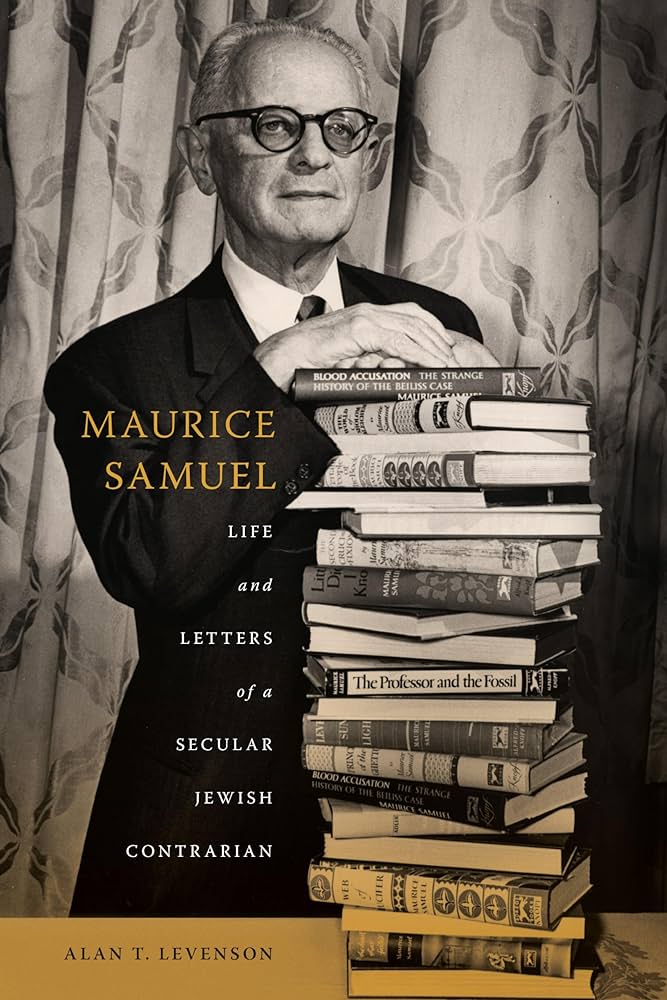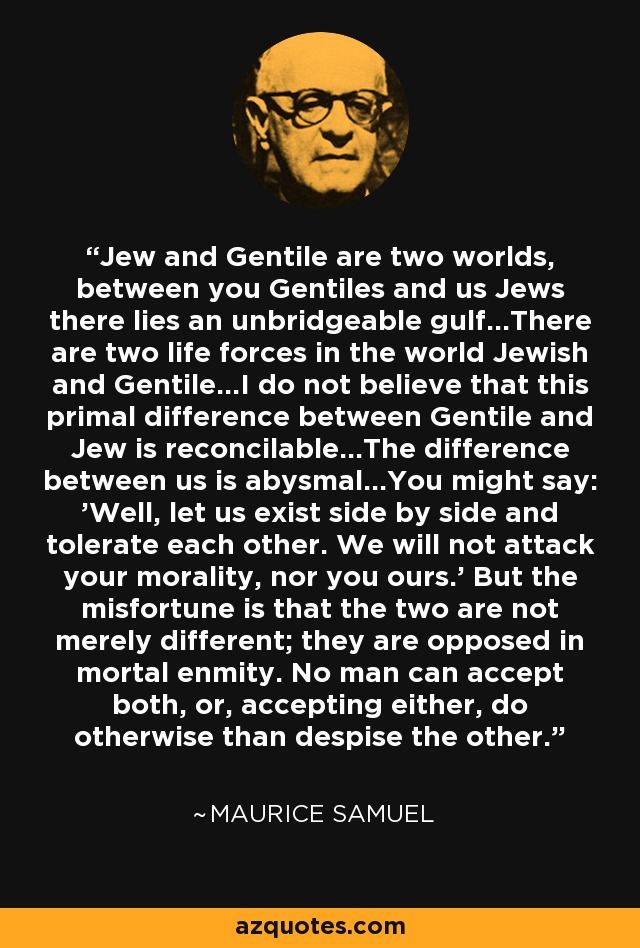Maurice Samuel - "Mortal Enmity" Exists Between Jews & Gentiles
April 14, 2024

Organized Jewry, with its absurd notion that Jews are God's Chosen People, when many are Satan's,
is responsible for destroying the human experiment. Cabalist Judaism (Freemasonry) is a satanic cult
masquerading as a religion. Organized Jewry and its lickspittal Gentile Freemasonry are behind the Plandemic, "vaccines," Gaza, Ukraine, Migration, gender dysphoria and cancel culture. They are the real "haters." We doomed the human race when we gave them our national credit cards.
Maurice Samuel (1895 - 1972) was a Romanian-born Zionist Jew whose most influential book was You Gentiles,1924.
This offered a penetrating analysis of the Jewish psyche and made the important point that Jews were altogether so superior and spiritually advanced compared to gentiles that there was no possibility of the two groups getting on together. Owing to the baser nature of the gentiles, and the fact that they did not take God seriously like the Jews, it was inevitable that Jews and gentiles should be at loggerheads for ever.
Here are some key quotations from the book:
IX WE, THE DESTROYERS
"We Jews are accused of being destroyers: whatever you put up, we tear down. It is true only in a relative sense. We are not iconoclasts deliberately: we are not enemies of your institutions simply because of the dislike between us. We are a homeless mass seeking satisfaction for our constructive instincts. And in your institutions we cannot find satisfaction; they are the play institutions of the splendid children of man - and not of man himself. We try to adapt your institutions to our needs, because while we live we must have expression; and trying to rebuild them for our needs, we unbuild them for yours." (p. 146-147)
"Because your chief institution is the social structure itself, it is in this that we are most manifestly destroyers." (p. 147)

"Dislike of the Jew in business springs from the feeling that we regard all your play-conventions with amusement - or even with contempt. Our abominable seriousness breaks jarringly into your life-mood. But you feel our disruptive difference most keenly, most resentfully, in our deliberate efforts to change your social system. We dream of a world of utter justice and God-spirit, a whole world which would be barren for you, devoid of all nourishment, bleak, unfriendly, unsympathetic. You do not want such a world: you are unapt for it. Seen in the dazzling lights of your desires and needs our ideal is repellently morose." (p. 148-149)
"We do wrong to thrust these ideals upon you, who are not for justice or peace, but for play-living. But we cannot help ourselves: any more than you can help resenting our interference. While we live we must give utterance to our spirit. The most insistent effort on our part will fail to change our nature." (p. 149)
"He [the Jew] is a citizen of the world; he is a son of humanity; the progress of all humankind, and not of only of any single group of it, is in his particular care." (p. 150)
"The unbelieving and radical Jew is as different from the radical gentile as the orthodox Jew from the reactionary gentile. The cosmopolitanism of the radical Jew springs from his feeling (shared by the orthodox Jew) that there is no difference between gentile and gentile. You are all pretty much alike: then why this fussing and fretting and fighting? The Jew is not a cosmopolitan in your sense." (p. 150)
"He is not one who feels keenly the difference between national and nation, and overrides it. For him, as for the orthodox Jew, a single temper runs through all of you, whatever your national divisions. The radical Jew (like the orthodox Jew) is a cosmopolitan in a sense which must be irritating to you: for he does not even understand why you make such a fuss about that most obvious of facts - that you are all alike. The Jew is altogether too much of a cosmopolitan - even for your internationalists." (p. 151)

"Nor in the handful of you who, against the desires and instincts of the mass of you, proclaim social justice as the life aim, is the Jew any more truly at home, at one with his milieu, than the old-time Jew in his world. Our [Jews'] very radicalism is of a different temper. Our spur is a natural instinct. We do not have to uproot something in ourselves to become 'radicals', dreamers of social justice. We are this by instinct: we do not see it as something revolutionary at all. It is tacit with us. But with you it is an effort and a wrench. Your very ancestry cries out against it in your blood... And you become silly and enthusiastic about it, with flag-waving, and shouting, and battle-hymns, and all the regular game-psychology proper to your world and way of life. Even of this you make a play." (p. 151-152)
"But such as these radical and international movements are, the modern Jew (the best and most thoughtful modern Jew, that is) is nearer to them than to anything else in your world. He is the only true socialist and cosmopolitan - but in such a true and tacit sense that he is completely distinguished from all of you. It is one of many vital paradoxes - a thing illogical and yet true to life. It is our very cosmopolitanism that gives us our national character. Because we are the only ones who are cosmopolitan by instinct rather than by argument we remain forever ourselves." (p. 152)
"We Jews, we, the destroyers, will remain the destroyers for ever. Nothing that you do will meet our needs and demands. We will for ever destroy because we need a world of our own, a God-world, which it is not in your nature to build. Beyond all temporary alliances with this or that faction lies the ultimate split in nature and destiny, the enmity between the Game and God. But those of us who fail to understand that truth will always be found in alliance with your rebellious factions, until disillusionment comes. The wretched fate which scattered us through your midst has thrust this unwelcome rôle upon us." (p. 155)
XI THE MASSES
"The nature of things cannot be solved because we partake of that nature. We can never get round ourselves: we can only turn round. Your world spins in a joyous illusion of progress; we, untouched by that illusion, destructive of your mood, stand aside, static, serious. We will be satisfied with nothing but the absolute." (p. 186-187)






